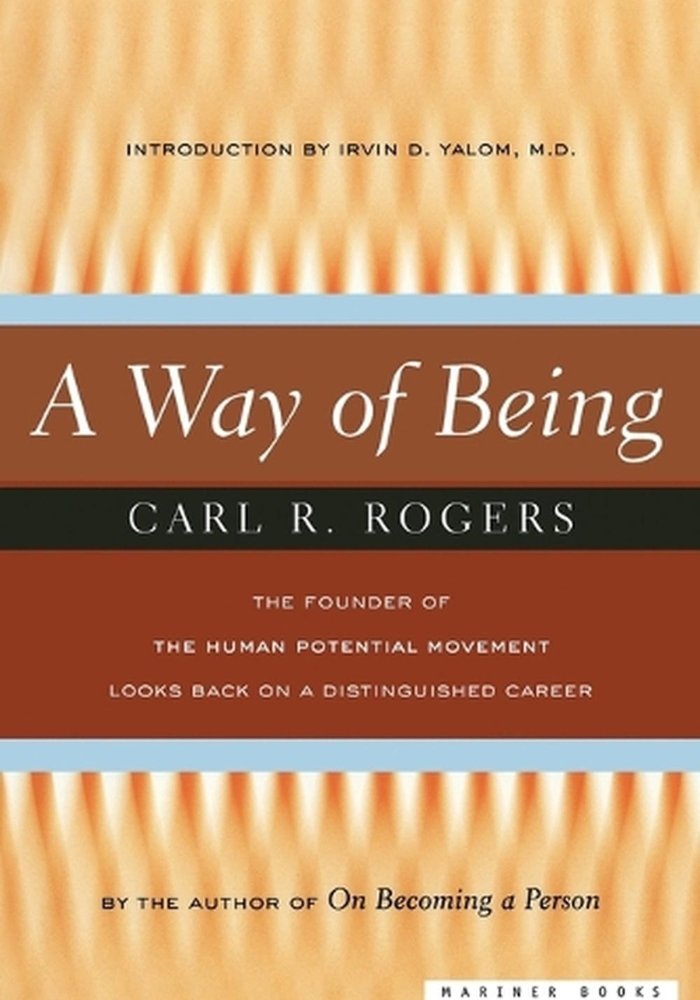Introduction
Welcome to a revelation in self-discovery through “A Way of Being” by Carl Rogers. This influential book, beautifully simple in its expression, explores the distinctive landscape of humanistic psychology. Rogers offers unique insights into our capacity for empathy, intrinsic motivations, and the quest for personal growth, distinguishing his approach from others. As we explore this profound work, I encourage you to uncover what it reveals about your own path to understanding and growth. Join me in unraveling how Rogers’ teachings can enhance our relationships and personal development, promising not just knowledge but a transformative experience.
The Essence of the Book
“A Way of Being” by Carl Rogers goes beyond the typical psychology manual, offering a unique narrative style filled with deep insights and practical guidance. Unlike conventional manuals that often focus on diagnostic criteria and treatment protocols, Rogers engages readers with a narrative that explores the nuances of everyday emotional experiences and existential challenges. He illuminates the human condition by highlighting our inherent potential for growth through key concepts such as empathy, unconditional positive regard, and authenticity. Rogers uniquely explains these ideas, demonstrating how embracing these qualities can lead us toward becoming fully functioning individuals. These are people who not only achieve personal harmony and self-awareness but also establish meaningful relationships. Through vivid examples and poignant quotes, Rogers outlines a transformative path that fosters deep personal change and a more authentic connection with others.
Empathy: The Heart’s Compass
Empathy, as Carl Rogers sees it, is more than an emotional response, it’s a transformative force. ‘Listening is a magnetic and strange thing, a creative force,’ Rogers writes, illustrating his belief in the power of truly hearing someone as fundamental to empathy. He posits that when we truly listen to others understanding their feelings and perspectives without judgment we foster an environment where individuals feel deeply valued and understood. Reflecting on this, I’ve recognized moments in my own life where genuine listening fostered significant growth and healing in relationships. This realization underscores the profound impact empathy can have, serving as a cornerstone for deeper connections and personal expansion.
The Fully Functioning Person: An Ideal or Achievable Reality?
Carl Rogers introduces the concept of the ‘fully functioning person’ an individual in fluid harmony with their emotions and experiences, who embraces openness to change and lives authentically. This ideal serves not just as a psychological benchmark but as a daily practice of embracing vulnerability and the unknown. Rogers challenges us to dismantle our personal barriers to growth, such as fear of change or discomfort with unfamiliar emotions, by adopting a mindset of continual openness and self-examination. It’s a profound call to action that pushes us to critically evaluate our own journey towards self-actualization. Are we truly living authentically, or are we held back by unseen fears? Rogers’ framework invites us to step into a life marked not by perfection but by an ongoing process of becoming.
The Power of Unconditional Positive Regard
In a society rife with expectations and judgments, Carl Rogers introduces the revolutionary concept of unconditional positive regard. This principle posits that accepting others without judgment fosters an environment where individuals can truly explore and accept their own identities. Rogers famously stated, “The curious paradox is that when I accept myself just as I am, then I can change.” Reflecting on this, I considered the often unspoken conditions I place on myself and others. Imagine a young adult burdened by academic and social expectations, when embraced unconditionally by a mentor, this individual gradually learns to accept their true self, leading to significant personal transformation. Unconditional positive regard not only challenges us to reassess our personal barriers but also encourages a life lived authentically, open to change and rich with genuine connections. This concept isn’t merely a therapeutic tool but a profound call to action, urging us toward self-actualization by dismantling the conditions we impose on ourselves and others.
Self-Concept and Conditions of Worth
Carl Rogers insightfully dissects how our self-perception and societal expectations intertwine, revealing a complex dance of identity. What is self-concept? It’s the elaborate portrait we paint of ourselves, capturing everything from our strengths to our shortcomings. Conditions of worth, on the other hand, act like a societal playbook we unwittingly adopt as our personal yardstick for self-evaluation.
Consider someone who adopts a trendy persona to blend in with a popular group, only to feel like an imposter. This mismatch between their authentic desires and the persona they project is a classic example of incongruence, a state where our real feelings are at odds with the roles we play, leading to distress and disconnection.
Rogers doesn’t just suggest, he urges us to break free from these societal molds to achieve congruence, where our genuine experiences and emotions sync perfectly with our self-image. He challenges us to embrace our true selves, casting off external expectations to light up our paths with authentic expression.
Becoming: The Unending Adventure of You
At the core of Carl Rogers’ teachings lies the exhilarating concept of “becoming” a perpetual journey of personal evolution that feels more like an endless road trip than a mere philosophical notion. Rogers compels us to soak up every moment, utilizing our triumphs and setbacks as the raw materials to mold our ideal selves.
This journey, while intimidating, is equally liberating. It teaches us that life isn’t merely a series of achievements to check off, but a continuous invitation to grow and transform. Imagine embracing life’s unpredictability with enthusiasm, viewing each new challenge as an opportunity to advance further into your personal development.
Rogers hands us the keys to view life not as a sprint to a predetermined finish line but as an ongoing quest for self-discovery. This perspective isn’t just thought-provoking, it’s a call to action to live profoundly, boldly crafting the narrative of our lives as we go.
Personal Reflections and Applications
Cracking open “A Way of Being” was like sitting down for a heart-to-heart with myself, an unfiltered dialogue about my strengths and shortcomings. Carl Rogers’ profound insights into empathy, acceptance, and the courage to be real have electrified my approach to relationships and self-discovery, propelling me toward a stance of bolder honesty and radical openness.
Rogers’ teachings transcend the confines of personal introspection, they are power tools that can revolutionize everyday interactions, from casual morning conversations to strategic leadership in the workplace. His principles don’t just fit into our lives they reshape them, offering transformative strategies that apply across an expanse of both personal and professional landscapes.
Every chapter challenges us to rethink our approaches and invites us to infuse authenticity into every facet of our lives. Engaging with Rogers’ ideas isn’t just about self-improvement it’s about setting a new standard for genuine interaction in every sphere we navigate.
Conclusion: A Call to Authenticity
“A Way of Being” isn’t merely a book it’s a wake-up call to shed our facades, illuminate our lives fully, and embrace our whole selves. Carl Rogers doesn’t simply invite us on this voyage, he challenges us to dive deep, grapple with our fears, strip away our guards, and uncover our genuine, unrefined selves.
This guide isn’t reserved for the therapists’ couch alone, it’s a blueprint for everyone. Rogers offers keys to a richer life that anyone can use, whether you’re reflecting in solitude or navigating the hustle of everyday interactions.
As we conclude this review, let’s take Rogers’ words to heart: “The good life is a process, not a state of being. It is a direction, not a destination.” Let’s not just amble along this path let’s charge forward, leap over obstacles, and dance through challenges, armed with empathy, acceptance, and unyielding authenticity. This isn’t just a journey, it’s a vibrant quest towards the fullest expression of who we can be. Let’s make every step count!






